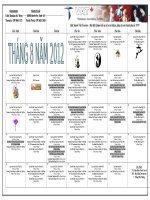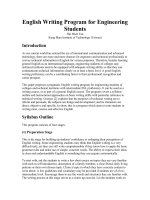ENGLISH PROGRAM 2
Bạn đang xem bản rút gọn của tài liệu. Xem và tải ngay bản đầy đủ của tài liệu tại đây (1.54 MB, 24 trang )
Grammar: Present perfect vs Past simple
Usage:
An action began in the past
now.
Ex: I have learn English for
3 years.
An action that happened in
the past at an unspecific
time.
Ex: They have lost my key.
An action has just
happened.
Ex: He has just gone out
Usage:
An action that happened
and ended at a specific time
in the past.
Ex: She learned English 3
years ago.
An action that happened
over a period but ended in
the past.
Ex: We skated for 15 years
but now we stop.
Tell a story
Ex: One upon a time, there
was a beautiful princess,….
Form
Present Perfect
S + have/has + Ved/Vc3 + O
S + have/has – not + Ved/Vc3
+ O
Have/has + S + Ved/Vc3 + O?
Simple past
S+ Ved/VC2 + O
S + didn’t + V + O.
Did + S + V + O?
Time expression
Since, for,
Already, yet,
Ever, never,
Several times,
For ages,
For a while,
..ago, last…, in 1991
When I was young.
Present perfect vs Present perfect
continuous
P.P emphasizes on
result
P.P.C emphasizes on
the continuity of time,
duration of time.
Both are used to describe an action that happened in the past now.
Form
Present Perfect
S + have/has + Ved/Vc3 + O
S + have/has – not + Ved/Vc3
+ O
Have/has + S + Ved/Vc3 + O?
Time expression: many
times, several times,..
Present Perfect
S + have/has + been _ Ving +
O
S + have/has – not + been –
Ving + O
Have/has + S + been _ Ving
+ O?
Time expression: “all day”,
“for ages”..
Past continuous
Usage:
An action that happened at a point of time in
the past:
I was teaching at this time yesterday.
An interrupted action
When he was watering the garden, it
rained.
Form:
S + was/were + V-ing + O
S + was/were _ not + V-ing + O
Were/was + S + V-ing + O?
Time expression: ago, last, yesterday, in
1992, ….(when, while)
Past perfect
An action that had happened before another
action that happened in the past.
She had left before I came.
After I had had breakfast, I went to class.
After the teacher entered class, students
stood up to say hello.
About Future
Simple present
Events schedule or
timetable (to be, open,
close, begin, start, end,
finish, arrive, come, leave,
return,…)
The train leaves
Sydney at 9.00
tomorrow.
Present continuous
A definite plan or an
arrangement.
Mark is taking his CEA
exam next week.









